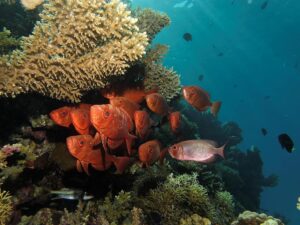
Virginia Schweiss, PhD, has built a career defined by innovation in marine conservation biology, a passion for education and a commitment to restoring coastal ecosystems. As founder and chief scientist of the Callie Mae Sea Foundation, she leads scientific initiatives focused on large-scale restoration, with responsibilities spanning grant writing, data analysis, project coordination and publication development. Under her leadership, the foundation achieved a historic milestone by releasing more than 125 million oyster larvae into the Gulf of Mexico, an unprecedented accomplishment that set a new benchmark for marine restoration efforts in the region.
Dr. Schweiss’ educational background was the foundation for this groundbreaking work. She earned a Doctor of Philosophy in coastal sciences from The University of Southern Mississippi, where her research deepened her expertise in Gulf Coast ecosystems and informed her practical approach to conservation. She also holds a Bachelor of Science in marine biology and biological psychology, enabling her to integrate ecological science with insights into human behavior and education. These academic achievements have allowed her to design conservation strategies that are both evidence-based and community-oriented.
Beyond her work in the field, Dr. Schweiss has contributed significantly to higher education. At the University of Hawai‘i – West O‘ahu, she teaches courses that range from human anatomy and physiology to Hawaiian environmental biology and general biology for non-majors. Her teaching offers students a holistic understanding of biology that is grounded in global science and local ecosystems. She has been an adjunct and visiting professor at various institutions including Chaminade University of Honolulu, Northwest Missouri State University, The University of Southern Mississippi and The University of Texas at San Antonio. Her leadership also extends beyond academia. She is a member and former president of the American Fisheries Society, helping shape national conversations around fisheries management and ecological restoration. Her credentials include certification as a PADI dive master and CrossFit level one trainer and instructor.
Early in life, Dr. Schweiss found inspiration for her scientific career after dissecting a starfish in science class, a moment that sparked curiosity despite growing up far from the coast in the Midwest. She credits her success to perseverance, support from her family and friends and a belief that meaningful change stems from dedication rather than accolades. She encourages her students to pursue science not for recognition, but to serve communities and ecosystems that rely on careful stewardship.
Dr. Schweiss remains active in environmental service through her involvement with the Coastal Estuarian Research Foundation and volunteer work with coastal cleanup efforts in Mississippi. Her work continues to evolve through new initiatives such as expanding oyster reef restoration using direct setting methods in the Mississippi Sound and advancing living shoreline projects along both the Gulf and Atlantic coasts. These efforts aim to bolster water filtration, protect shorelines and support marine biodiversity.
In the future, Dr. Schweiss plans to build on recent pilot studies, gather data for peer-reviewed publication and expand restoration efforts into regions such as Texas and Chesapeake Bay. By leveraging scientific evidence and collaborative partnerships, she is working to scale restoration methods that can reshape the future of marine ecosystems. Her career reflects dedication to science, education, and service, principles that continue to guide her work and inspire the next generation of environmental leaders.
